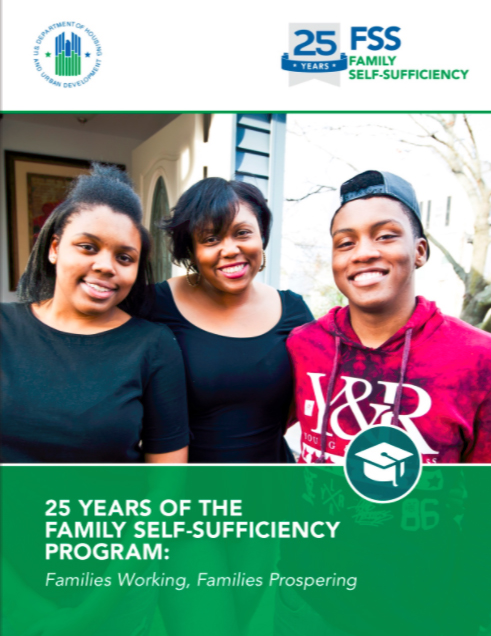Real Results: HUD Family Self-Sufficiency Program Delivers Success
 New digital book highlights 25-year anniversary of an innovative program that helps families build assets, financial capability and increase earnings.
New digital book highlights 25-year anniversary of an innovative program that helps families build assets, financial capability and increase earnings.
For more than 25 years, a HUD program known as Family Self-Sufficiency (FSS) has helped tens of thousands of subsidized housing residents make progress toward economic security.
Gregory is an example of the program’s success. After battling addiction and homelessness, he worked at low-wage jobs, trying to make ends meet. Once enrolled in Achieving Your Best Life, the Washington, D.C. Housing Authority’s FSS program, however, Gregory gained financial literacy skills, increased his income and graduated from the program into home ownership.
Gregory said, “I used to be living on the streets,” and now, “when I turn the doorknob to my house, it brings tears to my eyes. I never imagined that I’d be here.”
Digital Book Showcases Increased Financial Independence
Gregory is one of eight Americans featured in a new digital book Abt Global created for the U.S. Department of Housing and Urban Development (HUD) to highlight FSS’s 25-year history. FSS is a voluntary HUD program for subsidized housing residents to help them build earnings, assets and financial capability. FSS accomplishes this through case management or coaching and a financial incentive: an escrow savings account that grows with participants’ earnings.
More than 36,000 households successfully graduated from the FSS program between 2007 and 2016. Over the course of their participation in FSS, these households’ average annual income more than doubled, from about $10,300 at time of entry to more than $27,000 upon graduation.
HUD commissioned the digital book to mark the program’s anniversary and share success stories, like those of Gregory, as well as Angela, who graduated from college and traded a housing voucher for a lease on a house and a path to earning her Ph.D.
“With the support of the FSS program, I’ve been able to transition from being dependent…to a financially independent doctoral student,” Angela explained in the book.
Gregory, Angela, and other successful FSS graduates discuss their progress toward economic security with the services and supports from the program. While the standard FSS program duration is five years, many families graduate early.
Evidence from Massachusetts and Tools to Scale Up
Abt recently completed an evaluation of local FSS programs in Lynn and Cambridge, Massachusetts operated by the nonprofit Compass Working Capital, in partnership with public housing agencies in those communities. This evaluation found the Compass FSS program boosted participants’ annual household earnings by an average of $6,305. Program participants also experienced gains in credit scores and reductions in credit card and derogatory debt that exceeded available benchmarks. Abt also helped HUD develop a guidebook and online training on how to run an effective FSS program and a performance measurement system for these programs that is out for public comment. The guidebook and training will provide participants with guidance on how to strengthen their programs.
“When FSS is effectively implemented, it can make a real difference in helping low-income residents to increase their earnings and build assets and financial capability,” said Jeffrey Lubell, Abt director of housing and community initiatives. “We are pleased to partner with HUD to document the program’s important role and provide tools to help local implementing agencies strengthen their programs.”
See the 25th anniversary flipbook.
Learn more about Abt’s work in homeownership, financial capability, and asset building.
